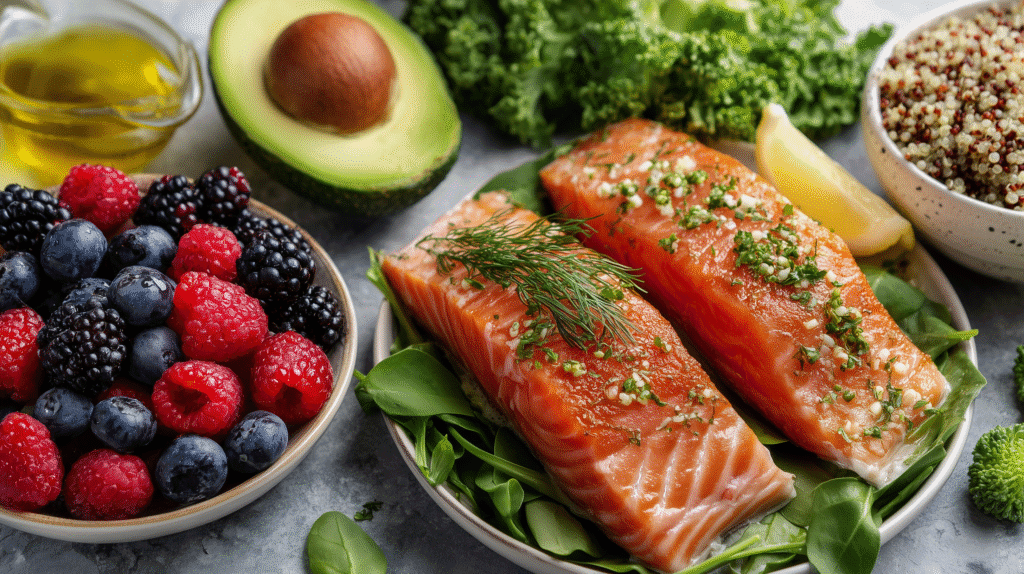The Diet Confusion Is Real (And It’s Not Your Fault)
If you’ve ever googled “what to eat for PCOS” and ended up more confused than when you started, you’re not alone. One website says go keto. Another swears by vegan. Then your doctor mentions “low glycemic,” but doesn’t explain what that actually means for your grocery list.
Here’s the truth: it’s not your fault. PCOS affects everyone differently, and the internet can make nutrition sound like rocket science. But underneath all that noise are a few simple, realistic food principles that can truly help balance your hormones and reduce your symptoms.
Forget the guilt and the “all-or-nothing” mindset. Let’s talk about real food for real life — no extremes, no quick fixes — just simple swaps that actually make a difference.
🚫 Foods That Can Make PCOS Symptoms Worse
Before we label foods as “bad,” it helps to understand why some choices make symptoms harder to manage. Two key players in PCOS are insulin resistance and inflammation.
Think of your hormones like a set of traffic lights. When everything is in sync, signals flow smoothly. But when insulin levels stay high from sugary or refined foods, it’s like all the lights turn red at once — causing a hormonal traffic jam.
Let’s clear the road by reducing the biggest troublemakers:
🥖 Refined Carbs and Sugar Bombs
White bread, pastries, and regular pasta can send your blood sugar on a roller coaster.
Simple swap: Choose whole-grain or sprouted-grain bread. Try chickpea or lentil pasta — extra protein, better balance.
☕ Sugary Drinks
Soda, fancy coffee drinks, and sweetened smoothies can spike your insulin.
Simple swap: Flavor your water with cucumber and mint or try unsweetened iced tea with lemon. Add a sprinkle of cinnamon to coffee — it can help manage blood sugar naturally.
🍪 Processed Snacks
Chips, crackers, and cookies are designed to be addictive and often loaded with trans fats that drive inflammation.
Simple swap: Crunch on raw veggies with hummus, a small handful of nuts, or air-popped popcorn with nutritional yeast.
🍟 Deep-Fried Favorites
French fries, donuts, fried chicken — the high-heat oils they’re cooked in can worsen insulin resistance.
Simple swap: Bake fries with olive oil or use an air fryer for crispiness without the inflammatory oils.
🥛 A Note on Dairy and Gluten
Some women with PCOS feel better limiting dairy or gluten, while others notice no difference. Pay attention to how your body reacts — bloating, fatigue, or breakouts may be signs of sensitivity.
If you suspect an issue, try removing these foods for two weeks and see how you feel. But if you tolerate them well, there’s no need for unnecessary restriction — whole-grain bread and Greek yogurt can be perfectly healthy choices.
🥦 Foods That Support Hormone Balance
Now for the good news — there are plenty of delicious foods that help your body work with you, not against you.
🌾 Fiber Is Your Friend
Fiber slows sugar absorption and helps your body flush out excess hormones.
Add more: Berries, chia seeds, flaxseed, leafy greens, lentils, and oats.
Tip: Start slow — your digestion needs time to adjust.
🍗 Lean Protein Power
Protein keeps you full longer, supports hormone production, and stabilizes energy.
Add more: Chicken, fish (especially salmon), eggs, Greek yogurt, tofu, or legumes.
Try to include protein with every meal — even snacks.
🥑 Healthy Fats Are Essential
Good fats reduce inflammation and keep hormones balanced.
Add more: Avocado, olive oil, nuts, seeds, and fatty fish.
These fats also make meals more satisfying, helping manage cravings.
🌶️ Anti-Inflammatory Superstars
Chronic inflammation acts like a slow burn in your body — these foods help cool it down.
Add more: Turmeric, ginger, leafy greens, green tea, and colorful veggies (the more colors, the better!).
🍽️ Simple Daily Swaps That Actually Work
Let’s get practical — here are easy changes that fit into everyday life.
| Instead of This… | Try This! |
|---|---|
| Cereal with milk | Greek yogurt with berries and granola |
| Sandwich on white bread | Lettuce or collard wraps with the same fillings |
| Afternoon candy bar | Apple slices with almond butter |
| White rice | Quinoa or cauliflower rice |
🌞 A Sample Day of PCOS-Friendly Eating
Breakfast: Veggie omelet with spinach and mushrooms, plus sprouted-grain toast and avocado.
Snack: Handful of walnuts and a small pear.
Lunch: Big salad with grilled chicken, chickpeas, and olive-oil dressing.
Snack: Carrot and cucumber sticks with hummus or tzatziki.
Dinner: Baked salmon, roasted broccoli, and sweet potato.
Evening treat: A small square of dark chocolate (yes, really!).
💬 Mindset Matters More Than Perfection
Here’s something most people don’t talk about — stress about food can be as harmful as the wrong food itself.
You don’t need a perfect diet to see improvement. One or two swaps each day truly add up. If you ate pizza last night, enjoy it, move on, and start again tomorrow.
Food isn’t punishment. It’s one of the ways you care for your body. Some days you’ll cook balanced meals; other days, you’ll grab cookies for dinner. That’s okay. PCOS management is a marathon, not a sprint.
Remember: you are not your diagnosis. You’re a woman learning what works for her unique body — and that’s something to celebrate.
🌸 Small Changes, Big Impact
Managing PCOS through food doesn’t require an extreme diet. It’s about consistent, kind choices that help your body thrive.
Start small: maybe swap your morning sugar coffee for one with cinnamon. Maybe add veggies to lunch. Notice how you feel — more energy, fewer crashes, calmer moods? Those are wins.
These foods won’t “cure” PCOS, but they can support your hormones and give your body what it needs to feel better, one choice at a time.
You’ve got this — and you’re not alone. Every woman in this community is learning, experimenting, and reclaiming her power right alongside you. 💕
Your turn: What’s one food swap you’re excited to try?
Share it in the comments below!
Next week, we’ll talk about why PCOS causes weight gain — and why it’s not your fault.
References:

